人教版高中英语必修五 Unit 1单词练习题及答案
人教版高中英语必修五Unit1单词练习题及答案.docx
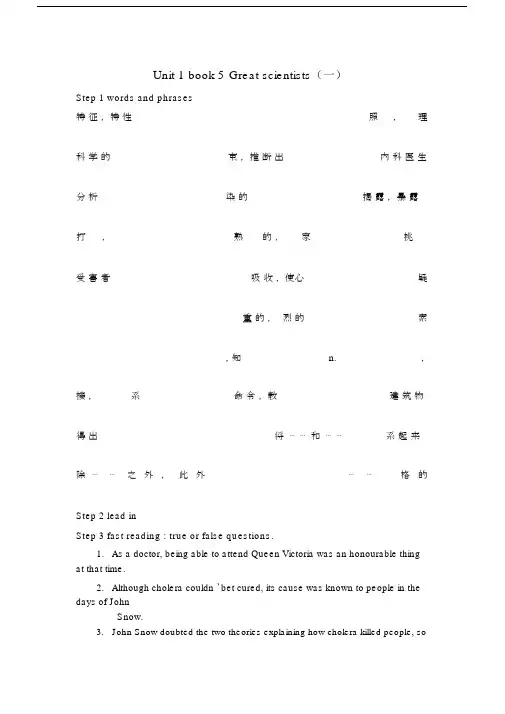
Unit 1 book 5Great scientists(一)Step 1 words and phrases特征,特性 __________________________________照,理________________科学的_________________束,推断出_____________ 内科医生_________________分析_________________染的_________________揭露,暴露_________________打,_________________ 熟的,家_________________挑_________________受害者 _________________吸收,使心_________________疑__________________________________重的,烈的 _________________索_________________,知________________n.________________,________________接,系________________命令,教________________建筑物________________得出____________________将⋯ ⋯ 和⋯ ⋯系起来__________________________除⋯⋯之外,此外______________________⋯⋯格的__________________________Step 2 lead inStep 3 fast reading : true or false questions.1.As a doctor, being able to attend Queen Victoria was an honourable thing at that time.2.Although cholera couldn ’bet cured, its cause was known to people in the days of JohnSnow.3.John Snow doubted the two theories explaining how cholera killed people, sohe didinvestigation to test them.4.The results wouldn ’havet been so clear without the map John Snow haddrawn.5.The polluted dirty water from the river was to blame for the disease.Step 4 detailed reading: read again and fill in the chart.Scientific Report by John SnowThe problem Nobody knew the _________ of the serious disease of __________.The cause Idea 1:Idea 2:Tr The method_____________data from the next cholera attack to test theories.______________ which method was correct.The results He found the cause of cholera was ______________________ water.Idea 1 or 2? Why?Idea _______. because the data showed a _______________with the water.The conclusion John Snow was able to defeat cholera once its cause was known.Step 5 important sentences1.John Snow suspected that the second theory was correct but he neededevidence.2.The cholera outbreak was so severe that more than 500 people died in 10 days.3.John Snow had not foreseen this, so he made further investigations.4.It seemed that the water was to blame.5.He found that it came from the river polluted by the dirty water from London.6.With this extra evidence, John Snow was able to announce with certaintythat pollutedwater carried the virus.Step 6 language points 见非常学案Step 7 discussion1.Cholera was a 19th century disease. What disease do you think is similar tocholera today? Why?2. John Snow believed Idea 2 was right. How did he finally prove it?Homework:非常学案ANSWERS:STEP 1characteristic radium attend scientific conclude physiciananalyse infectious expose defeat expert challenge victim absorbsuspect enquiry severe clue foresee investigation blame link instructconstruction draw a conclusion link...to...Apart...from... Be strict withSTEP 3TFFTTSTEP 4Scientific Report by John SnowThe problem Nobody knew the ____cause_____ of the serious disease of ___cholera______ The cause Idea 1: cholera multiplied in the air. A cloud of dangerous gas floated around un found its victims.Idea 2: people absorbed this disease into their bodies with their meals.The method___collect__________data from the next cholera attack to test theories. Tr _______prove_______ which method was correct.The results He found the cause of cholera was ____polluted__________________ water. Idea 1 or 2? Why?Idea ___2____. because the data showed a ____connection____with the water. The conclusion John Snow was able to defeat cholera once its cause was known.新课标第一网。
人教版高中英语必修五第一单元练习题(含参考答案)
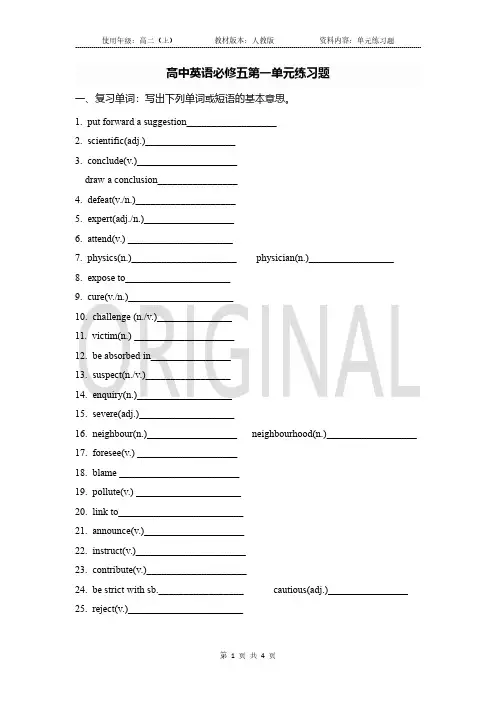
高中英语必修五第一单元练习题一、复习单词:写出下列单词或短语的基本意思。
1.put forward a suggestion__________________2.scientific(adj.)__________________3.conclude(v.)____________________draw a conclusion________________4.defeat(v./n.)____________________5.expert(adj./n.)__________________6.attend(v.)_____________________7.physics(n.)_____________________physician(n.)_________________8.expose to_____________________9.cure(v./n.)_____________________10.challenge(n./v.)_______________11.victim(n.)____________________12.be absorbed in________________13.suspect(n./v.)_________________14.enquiry(n.)___________________15.severe(adj.)___________________16.neighbour(n.)__________________neighbourhood(n.)__________________17.foresee(v.)____________________18.blame________________________19.pollute(v.)_____________________20.link to_________________________21.announce(v.)____________________22.instruct(v.)______________________23.contribute(v.)____________________24.be strict with sb._________________cautious(adj.)________________25.reject(v.)_______________________二、选词填空。
人教版高中英语必修五 Unit1_核心词汇综合达标 词汇训练 Word版含答案
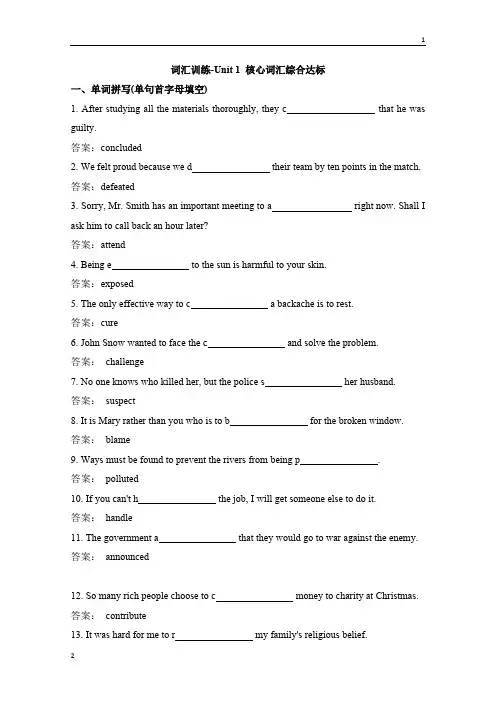
词汇训练-Unit 1 核心词汇综合达标一、单词拼写(单句首字母填空)1. After studying all the materials thoroughly, they c that he was guilty.答案:concluded2. We felt proud because we d their team by ten points in the match.答案:defeated3. Sorry, Mr. Smith has an important meeting to a right now. Shall I ask him to call back an hour later?答案:attend4. Being e to the sun is harmful to your skin.答案:exposed5. The only effective way to c a backache is to rest.答案:cure6. John Snow wanted to face the c and solve the problem.答案:challenge7. No one knows who killed her, but the police s her husband.答案:suspect8. It is Mary rather than you who is to b for the broken window.答案:blame9. Ways must be found to prevent the rivers from being p .答案:polluted10. If you can't h the job, I will get someone else to do it.答案:handle11. The government a that they would go to war against the enemy.答案:announced12. So many rich people choose to c money to charity at Christmas.答案:contribute13. It was hard for me to r my family's religious belief.14. Let's a the problem and see what went wrong.答案:analyse15. We can plant more trees because trees a carbon dioxide in the air to produce oxygen.答案:absorb二、单词拼写(根据中文提示拼写单词)1. When (参加) networking events, ask others what they do and think about how you can help them.答案:attending2. The police tried to get some clues from the (嫌疑犯), but he remained silent.答案:suspect3. He did not want to (显露) his fears and insecurity to anyone.答案:expose4. It is a great (挑战) for him to govern the country well.答案:challenge5. We can (推断出) from what he has said that he is a good manager.答案:conclude6. He is extremely (谨慎的) about the use of words.答案:cautious7. To our surprise, the old doctor (治愈) my cousin of her cancer.答案:cured8. Many people (责备、指责) this change on gases such as carbon dioxide.答案:blame9. Companies that (污染) China's ocean waters usually feel little pressure from the government.10. Having (分析) the results, Dr. Snow drew a conclusion that water had caused the disease.答案:analysed11.The army was well-trained and well-armed, and had little difficulty (战胜) their enemy.答案:defeating12. Fresh air and exercise (有助于) to good health.答案:contribute13. I can't carry the bucket if the (把手) is broken.答案:handle14. Ladies and gentlemen, I come here to (宣布) the winner of the competition.答案:announce15. She is kind-hearted. You shouldn't (拒绝) her offer.答案:reject三、翻译(根据中文提示完成句子)1. (我需要把我的手表指针往前拨)。
人教版新课标高中英语 必修五Unit 1 Great scientists 单元测试 含答案详解
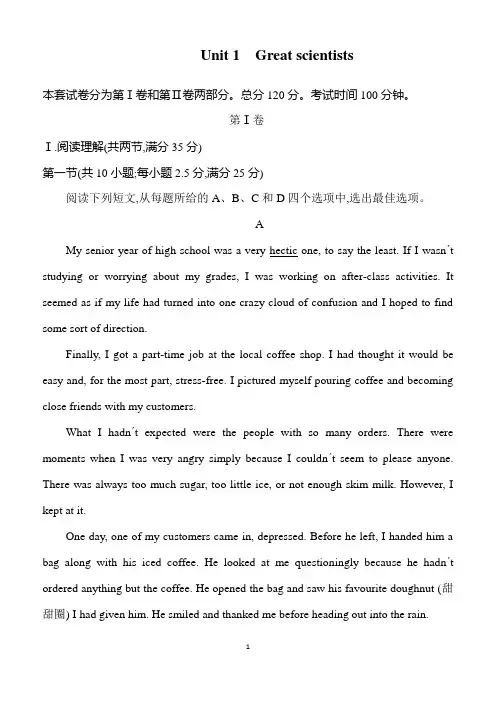
Unit 1Great scientists本套试卷分为第Ⅰ卷和第Ⅱ卷两部分。
总分120分。
考试时间100分钟。
第Ⅰ卷Ⅰ.阅读理解(共两节,满分35分)第一节(共10小题;每小题2.5分,满分25分)阅读下列短文,从每题所给的A、B、C和D四个选项中,选出最佳选项。
AMy senior year of high school was a very hectic one, to say the least. If I wasn´t studying or worrying about my grades, I was working on after-class activities. It seemed as if my life had turned into one crazy cloud of confusion and I hoped to find some sort of direction.Finally, I got a part-time job at the local coffee shop. I had thought it would be easy and, for the most part, stress-free. I pictured myself pouring coffee and becoming close friends with my customers.What I hadn´t expected were the people with so many orders. There were moments when I was very angry simply because I couldn´t seem to please anyone. There was always too much sugar, too little ice, or not enough skim milk. However, I kept at it.One day, one of my customers came in, depressed. Before he left, I handed him a bag along with his iced coffee. He looked at me questioningly because he hadn´t ordered anything but the coffee. He opened the bag and saw his favourite doughnut (甜甜圈) I had given him. He smiled and thanked me before heading out into the rain.The next evening, he came. Instead of ordering something, he handed me a single pink rose and a note.“Thanks for being so sweet and thoughtful yesterday. It is so nice to meet someone who´s warm and unselfish. Please don´t change your ways because I truly believe that you will do better. Have a great day!”As time went on, I did come across some customers really particular. But anytime I felt depressed, I thought of that man and his kindness. Then I would smile, hold my head up high, clear my throat and ask politely, “How can I help you?”1.What does the underlined word “hectic” in Paragraph 1 mean?A. Glad.B. Interesting.C. Productive.D. Busy.2.What can we know about the author´s part-time job?A. It is easy and stress-free.B. It is quite busy and challenging.C . It doesn´t need special skills. D. It gives the author a feeling of freshness.3.What´s the message the author wants to convey?A. Kind words are worth much but cost little.B. It is impossible to satisfy everyone in our life.C. A small act of kindness can make a big difference.D. Our attitude determines our suffering or our freedom.BAn idea that started in Seattle´s public library has spread throughout America and beyond. The idea is simple: help to build a sense of community in a city by getting everyone to read the same book at the same time.In addition to encouraging reading as a pursuit(爱好) to be enjoyed by all, theprogramme allows strangers to communicate by discussing the book on the bus, as well as promoting reading as an experience to be shared in families and schools. The idea came from Seattle librarian Nancy Pearl who launched (发起)the “If All of Seattle Read the Same Book” project in 1998. Her original programme used author visits, study guides and book discussion groups to bring people together with a book, but the idea has since expanded to many other American cities, and even to Hong Kong.In Chicago, the mayor appeared on television to announce the choice of To Kill a Mockingbird as the first book in the “One Book, One Chicago” programme. As a result, reading clubs and neighbourhood groups sprang up around the city. Across the US, stories emerged of parents and children reading to each other at night and strangers chatting away on the bus about plot and characters.The only problem arose in New York, where local readers could not decide on one book to represent the huge and diverse population. This may show that the idea works best in medium-sized cities or large towns, where a greater sense of unity(一致)can be achieved.Or it may show that New Yorkers rather missed the point, putting all their energy and passion into the choice of the book rather than discussion about a book itself.As Nancy points out, the level of success is not measured by how many people read a book, but by how many people are enriched by the process or have enjoyed speaking to someone with whom they would not otherwise have shared a word.4.What is the purpose of the project launched by Nancy?A.To invite authors to guide readers.B.To encourage people to read and share.C.To involve people in community services.D.To promote the friendship betweencities.5.Why was it difficult for New Yorkers to carry out the project?A.They had little interest in reading.B.They were too busy to read a book.C.They came from many different backgrounds.D.They lacked support from the local government.6.The underlined words “shared a word” in Paragraph 5 probably mean .A.exchanged ideas with each otherB.discussed the meaning of a wordC.gained life experienceed the same languageCScientific experiments can sometimes go wrong and when they do, the results may range from the disastrous (灾难性的) to the troubling. One such experiment took place in South America about fifty years ago. Whether its final consequences will cause serious damage or nothing more than a small trouble still remains to be seen.The story began in 1956 when an American scientist working in Brazil decided to solve the problem of increasing the productivity of that country´s bees. He imported a very active type of African bee from Tanzania and mated (交配) it with the more easy-going native variety to produce a new kind of bees. The new bees worked harder and produced twice as much honey. It seemed that Professor Kerr, which was the scientist´s name, had a total success on his hands.Then things began to go wrong. For some reason as yet unseen, but perhaps as a result of something in their environment, the new bees began to develop extremely attacking personalities. They became bad-tempered and easy to be angry. They attacked the native bees and drove them from their living places.But worse was to follow. Having taken over the countryside, the new bees, with their dangerous stings (刺), began to attack their neighbours—cats, dogs, horses, chickens and finally man himself. A long period of terror began that has so far killed a great number of animals and about 150 human beings.This would have been bad enough if the bees had stayed in Brazil. But now they are on the move, heading northwards in countless millions towards Central and North America, and moving at the alarming speed of 200 miles a year. The countries that lie in their path are naturally worried because it looks as if nothing can be done to stop them.7. The results of the South American experiment .A.are not importantB.are not yet certainC.have caused a serious troubleD.have proved to be wrong8. The experiment mentioned in this passage was designed to .A.make African bees less activeB.increase the number of bees in BrazilC.make Brazilian bees more easy-goingD.increase the amount of honey in Brazil9. Which of the following may be the cause of the new bees´ attacking personalities?A.Their bad temper.B.Their hard work.C.Their production of honey.D.Their living environment.10. The last paragraph implies that .A.the bees prefer to live in BrazilB.the bees must be stopped from moving northC.the bees may bring about trouble in more countriesD.the bees have been driven to Central and North America第二节阅读七选五(共5小题;每小题2分,满分10分)根据短文内容,从短文后的选项中选出能填入空白处的最佳选项。
(完整版)人教新课标必修五Unit1词汇专项练习
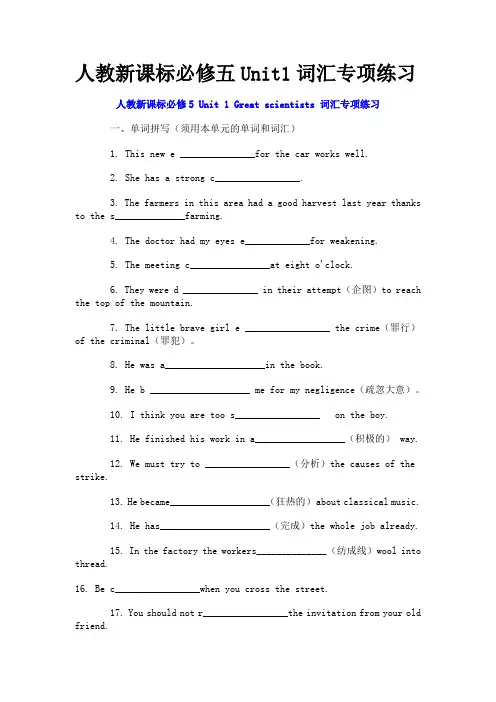
人教新课标必修五Unit1词汇专项练习人教新课标必修5 Unit 1 Great scientists 词汇专项练习一、单词拼写(须用本单元的单词和词汇)1. This new e _______________for the car works well.2. She has a strong c_________________.3. The farmers in this area had a good harvest last year thanks to the s______________farming.4. The doctor had my eyes e_____________for weakening.5. The meeting c________________at eight o'clock.6. They were d _______________ in their attempt(企图)to reach the top of the mountain.7. The little brave girl e _________________ the crime(罪行)of the criminal(罪犯)。
8. He was a____________________in the book.9. He b ____________________ me for my negligence(疏忽大意)。
10. I think you are too s_________________ on the boy.11. He finished his work in a__________________(积极的) way.12. We must try to _________________(分析)the causes of the strike.13. He became____________________(狂热的) about classical music.14. He has______________________(完成)the whole job already.15. In the factory the workers______________(纺成线)wool into thread.16. Be c_________________when you cross the street.17. You should not r_________________the invitation from your old friend.18. What is your v__________________on Chinese education?19. The police are watching the man's m_________________secretly.20. The class needs a s__________________teacher.21. Kindness is one of the prime minister's __________________(特征)。
人教版高中英语必修五第一单元练习题(含参考答案)

高中英语必修五第一单元练习题一、复习单词:写出下列单词或短语的基本意思。
1.put forward a suggestion__________________2.scientific(adj.)__________________3.conclude(v.)____________________draw a conclusion________________4.defeat(v./n.)____________________5.expert(adj./n.)__________________6.attend(v.)_____________________7.physics(n.)_____________________physician(n.)_________________8.expose to_____________________9.cure(v./n.)_____________________10.challenge(n./v.)_______________11.victim(n.)____________________12.be absorbed in________________13.suspect(n./v.)_________________14.enquiry(n.)___________________15.severe(adj.)___________________16.neighbour(n.)__________________neighbourhood(n.)__________________17.foresee(v.)____________________18.blame________________________19.pollute(v.)_____________________20.link to_________________________21.announce(v.)____________________22.instruct(v.)______________________23.contribute(v.)____________________24.be strict with sb._________________cautious(adj.)________________25.reject(v.)_______________________二、选词填空。
人教版新课标高中英语 必修五 Unit 1 Great scientists Writing 配套练习 含答案详解
Unit 1Great scientistsWritingⅠ.基础写作专练:根据句意完成句子, 注意连接词的正确使用1., there is a museum near the theatre.另外, 在这家剧院附近有一家博物馆。
2.Through these websites, I can read some classic English passages, poems and stories. , I can learn some learning skills and methodologies, which play an important part in my study process.通过这些网站, 我可以阅读一些经典的英语文章、诗歌和故事。
更多的是, 我可以学会一些学习技能和方法, 它们在我的学习过程中起着重要的作用。
3., it was harder than we had expected.然而, 这比我们所期望的要更难。
4., I took many falls off the bike.更糟糕的是, 我总是从自行车上摔下来。
5., we should learn how to get along well with others.另外, 我们应该学会怎样和他人很好地相处。
6.In our school, , things are quite different.然而在我们学校, 情况却完全不一样。
7.I think we will have a good time there I will send you photos taken there.我想我们在那里会玩得很愉快, 而且我将会把在那里拍的照片发送给你。
8., do let me know if you need more information.另外, 如果你需要更多的信息, 一定要告诉我。
9.He was tired, he kept working.他累了, 可是他还继续工作。
人教版英语必修五第一单元练习题(附答案)
人教版英语必修五第一单元练习题(附答案)II.完形填空A successful scientist is generally a good observer.He makes full16 of the facts he observes.He doesn’t accept ideas which are not17on obvious facts,and therefore refuses to accept authority(权威)as the only18for truth.He always19ideas carefully and makes experiments to prove them.The rise of20science may perhaps be considered to21as far back as the22of Roger Bacon,the wonderful philosopher(哲学家)of Oxford,who live23the years1214and1292.He was probably the first in the middle 24to suggest that we must learn science25observing and experimenting on the things around us,and he himself26many important discoveries.Galileo,however,who lived more than300years later(1564-1642),was the greatest of several great men,27in Italy,France,Germany,or England,began by28to show how many important29could be discovered by observation.Before Galileo,learned men believed that large bodies fell more30towards the earth than small ones,31Aristotle said so.But Galileo,going to the32of the leaning Tower of Pisa,let fall two 33stones and proved Aristotle was wrong.It was Galileo’s35of going direct to Nature,and proving our35and theories by experiment,that has led to all the discoveries of modern science.16. e B.time C.speed D.trust17. A.worked B.based C.lived D.written18. A.reason B.cause C.advice D.result19. A.thinks B.checks C.has D.learn20. A.natural B.physical C.ancient D.modern21. A.date B.keep C.look D.take22. A.study B.time C.year D.birth23. A.both B.each C.between D.among24. A.schools B.ages C.days D.countries25. A.in B.with C.on D.by26. A.did B.made C.took D.gave27. A.who B.when C.that D.where28. A.ways B.degrees C.levels D.chance29. A.truths B.problems C.people D.subjects30. A.slowly B.rapidly C.lightly D.heavily31. A.although B.because C.when D.If32. A.place B.foot C.top D.ceiling33. A.big B.small C.equal D.unequal34. A.spirit B.skill C.theory D.discovery35. A.plans B.opinions C.world D.AbilityIII.单词拼写(根据句意及所给首字母写出正确的单词)及完成句子翻译。
最新版2019-2020年人教版高中英语必修五Unit1单元综合复习及答案-精编试题
必修5 Unit 1 Greatest scientistsI. 单元基础知识1. 核心单词(1)vt. 打败;战胜(2) n. 专家;行家(3) v. 照顾;参加(4) vt. 建设(5) vt. 暴露;揭露(6) vt. 吸收;吸引(7) vt. 怀疑n. 嫌疑犯(8) physician n.(9) severe adj.(10) announce v. →announcer n.(11) blame vt. & n.(12) instruct vt.→n. instructions→adj. instructive 2.高频短语(1) 除……之外(2) 为……负责(3) 有意义,讲得通(4) 对……严格(5) be absorbed in(6) make up one’s mind(7) make room for(8) put forward3.重点句型(1) ____its cause ____its cure was understood.人们既不知道它的病源,也不了解对它的治疗。
(2)So many thousands of terrified people died_____________________.因此每一次暴发(霍乱)都会有成千上万恐慌的人死去。
(3)He knew that cholera would ____ be controlled______ its cause was found.他知道,在找到病源之前,霍乱疫情是无法控制的。
(4)To prevent this from happening again,John Snow__________the source of all the water supplies__________.为防止这种情况再度发生,约翰·斯诺建议所有水源都要经过检测。
(5)He placed a fixed sun at the centre of the solar system _________________________...他把太阳固定在太阳系的中心位置上,而行星围绕着太阳转……II. 考点精析及演练1. conclude v. 断定,推断出;得出结论;使结束,终止(end)【常见搭配】conclude sth.(from sth.) /that... (从……)推断出,断定arrive at/reach/come to/draw a conclusion得出结论in conclusion总之;最后【语境填空】①从特朗普的演讲中你得出什么结论了?________ do you ________ the speech of Trump?②他以一句名言“有志者,事竟成”结束了他的演讲。
[高中英语]人教高中英语必修5-Unit 1课时练习及解析
人教版高中英语必修五Unit 1 课时练习Ⅰ.单项填空1.(2012年安阳模拟)I ________ along the street looking for a place to park when the accident ________.A.went;was happeningB.went;happenedC.was going;happenedD.was going;had happened解析:本题考查一般过去时与过去进行时的用法.be doing...when...此句式表达“正在干……这时(又发生)……”,只有C项符合这一用法.答案:C2.In ________ review of 44 studies,American researchers found that men and women who ate six key foods daily cut the risk of ________ heart disease by 76%.A.a;the B.the;aC.a;/ D./;a解析:第一空表示“一份44个研究课题组成的调查显示”,故第一空选不定冠词a;第二空heart disease(心脏病)习惯上不用冠词.答案:C3.When I got there,he was ________ a wedding party.A.attending B.joiningC.attending to D.joining in解析:attend表示出席或参加典礼、仪式等.答案:A4.—Would you p lease help me with the box?—________.A.Yes,please B.No,please don'tC.With pleasure D.My pleasure解析:考查情景交际.在英语中对于别人提出的帮助请求,通常用with pleasure(非常乐意)回答;my pleasure用来表示你帮对方做了某事后,别人向你表示感谢的用语,意思是“这是我乐意做的”.答案:C5.—Which doctor is ________ your wound?—Doctor Wang.A.curing B.treatingC.operating D.attending解析:强调治疗的过程.故选B项.答案:B6.The boy ________ by the police has no parents.A.questioned B.has been questionedC.havig been questioned D.questioning解析:句子的主语the boy和分词之间存在着动宾关系,所以应该选择A.答案:A7.(2012年阿勒泰月考)He always gives students enough time to ________what they have just learnt.A.attract B.absorbC.get D.receive解析:absorb在此处作“理解,掌握(知识)”讲.故选B项.答案:B8.________ for the terrible coal mine accident,as the public thought,the mayor of the city felt nervous and was at a loss w hat to do.A.Having blamed B.He was to blameC.Being to be blamed D.Being to blame解析:主语是the mayor,be to blame for sth.是“应承担责任”,此处是现在分词短语作状语.答案:D9.It's said that driving after drinking ________ thousands of traffic accidents every year.A.results from B.contributes toC.devotes to D.lies in解析:contribute to导致,符合句意.答案:B10.There are many toys on the shelf and you can use whichever you want,but please ________ them ________ when you have finished playing with them.A.put;on B.put;downC.put;back D.put;off解析:put back把……放回原处,符合句意.答案:C11.(2012年阜新模拟)She smiled happily,________ a set of amazing white teeth.A.exposing B.being exposedC.exposed D.to expose解析:分词短语作状语,和其逻辑主语she之间为主谓关系.答案:A12.Your composition is well-written ________ some spelling mistakes.A.besides B.except forC.as well as D.in addition to解析:此处是指在细节上对整体加以修正说明,故用except for.答案:B13.Dogs have a very good ________ of smell and are often used to search for su rvivors in the earthquake.A.sense B.viewC.means D.idea解析:have a sense of smell有嗅觉感,固定用法.答案:A14.He suggested ________ a meeting and it suggested that he ________ in our plan.A.to hold;was interestedB.holding;was interestedC.holding;should be interestedD.should hold;be interested解析:suggest doing sth.固定用法;第二个空由于主句中suggest的意思为“暗示”,固其后的宾语从句应用陈述语气.答案:B15.(2012年昆明统考)—What's the matter?—I can't get the engine ________.A.running B.runC.to run D.ran解析:get sth. doing使……开始行动起来.答案:AⅡ.完形填空阅读下面短文,从短文后各题所给的四个选项(A、B、C和D)中选出可以填入空白处的最佳选项.Once a farmer had some puppies to sell.He pain ted a(n) __16__advertising th pups and set about nailing it to a post on the edge ofhis yard.__17__ he was driving the last nail into the post,he felt a sudden pull on his trousers.He __18__ down into the eyes of a little boy.“Mister,” he said,“I want to buy one of your puppies.”“Well,”said the farmer,as he rubbed the sweat off the back of his __19__,“these puppies come from fine parents and __20__ a good deal of money.”The boy __21__ his head for a moment.Then reaching deep into his pocket,he pulled out a handful of __22__ and held it up to the farmer.“I've got thirty-nine cents.Is that enough to take a look?”“Sure,” said the farmer.And with that he __23__ a whistle,“Here,Dolly!” he called.__24__ from the doghouse and down the road ran Dolly __25__ by four little balls of fur.As the dogs made their __26__ to the fence,the little boy noticed something else moving inside the doghouse.__27__ another little ball appeared,this one noticeably smaller.The little pup began walking unsteadily toward the others,doing its best to __28__.“I want that one,” the little boy said,__29__ at the runt(矮个子).The farmer knelt down at the boy's side and said,“Son,you __30__ want that puppy.He will never be able to __31__ and play with you as other dogs would.”With that the little boy __32__ back from the fence,reached down,and began rolling up one leg of his __33__.In doing so he showed a steel br ace(支柱) running down both sides of his leg attaching itself to a __34__ made shoe.Looking back up at the farmer,he said,“You see,sir,I don't run too well myself,and he will need someone who understands.”The __35__ is full of people who need someone who understands.16.A.sight B.paperC.information D.sign解析:由下文可知,农夫要出售小狗,所以画了一个招牌(sign)做广告,其他选项都不符合语境.答案:D17.A.Then B.BeforeC.As D.After解析:此处as表示“当……的时候”.答案:C18.A.put B.lookedC.knelt D.stared解析:一个小孩拉着农夫的裤腿儿,农夫自然要低头看(look down).答案:B19.A.nose B.neckC.head D.face解析:由常识判断,脖子(neck)后面会出汗,而鼻子(nose)、头(head)或脸(face)的背面不可能出汗.答案:B20.A.spend B.spareC.make D.cost解析:农夫说这些小狗要花费(cost)很多钱.答案:D21.A.raised B.liftedC.fell D.dropped解析:小男孩低下头(dropped his head)想了一会儿,然后伸进口袋摸了摸,拿出一把零钱(change)递给农夫.答案:D22.A.notes B.changeC.sugar D.goods解析:参见上题解析.答案:B23.A.let out B.carried outC.put out D.lef t out解析:农夫吹了(let out)一声口哨,let out发出(叫声等);carry out执行;put out扑灭;leave out遗漏,省去.答案:A24.A.Up B.OverC.Out D.In解析:根据语境可知,母狗Dolly是从狗屋里出来的(out),注意此处out引导的是倒装结构.答案:C25.A.came B.followedC.went D.caught解析:后面跟着四只毛茸茸的小狗.此处用过去分词followed作定语,表示“被……跟着”.答案:B26.A.step B.wayC.walk D.drive解析:固定词组make one's way表示“行进,前往”.答案:B27.A.Quickly B.SlowlyC.Oddly D.Sadly解析:此时又有一只小狗慢慢地走出来.由后面的walking unsteadily可知应选B.quickly 快速地;oddly古怪地;sadly悲伤地,都与语境不符.答案:B28.A.get up B.stand upC.catch up D.move up解析:这只小狗试图尽全力去赶上(catch up)其他小狗.答案:C29.A.moving B.pointingC.calling D.turning解析:从常识看,小男孩应该是指着(pointing)那只小狗说“我要那只”.答案:B30.A.mustn't B.don'tC.can't D.needn't解析:农夫告诉小男孩:“孩子,你是不会要那只狗的……”.mustn't禁止;can't不能;needn't不必,都不符合语境.答案:B31.A.run B.sitC.walk D.stand解析:农夫告诉小男孩“这只小狗永远也不会跑(run)”.答案:A32.A.stepped B.talkedC.climbed D.fell解析:小男孩听到这些话后,从篱笆处退后一步(stepped back),弯腰拉起自己的一只裤腿儿(trousers)给农夫看.答案:A33.A.clothes B.dressesC.sweaters D.trousers解析:参见上题解析.答案:D34.A.simply B.speciallyC.carefully D.newly解析:由上文看,小男孩的这只鞋子应该是特制的(specially made).答案:B35.A.farm B.countryC.city D.world解析:最后作者感慨:这个世界上有许多人需要人们的理解.答案:DⅢ.阅读理解(2012年山东卷,B)阅读下列短文,从每题所给的四个选项(A、B、C和D)中选出最佳选项.One of the greatest contributors to the first Oxford English Dictionary was also one of its most unusual.In 1879,Oxford University in England asked Prof.James Murray to serve as editor for what was to be the most ambitious dicti onary in the history of the English language.It would include every English word possible and would give not only the definition but also the history of the word and quotations(引文) showing how it was used.This was a huge task,so Murray had to find volunteers from Britain,the United States,and the British colonies to search every newspaper,magazine,and book ever written in English.Hundreds of volunteers responded,including William Chester Minor.Dr.Minor was an American surgeon who had served in the Civil War and was now living in England.He gave his address as “Broadmoor,Crowthorne,Berkshire,” 50 miles from Oxford.Minor joined the army of volunteers sending words and quotations to Murray.Over the next 17 years,he became one of the staff's most valued contributors.But he was also a mystery.In spite of many invitations,he would always decline to visit Oxford.So in 1897,Murray finally decided to travel to Crowthorne himself.When he arrived,he found Minor locked in a book-lined cell at the Broadmoor Asylum(精神病院) for the Criminally Insane.Murray and Minor became friends,sharing their love of words.Minor continued contributing to the dictionary,sending in more than 10,000 submissions in 20 years.Murray continued to visit Minor regularly,sometimes taking walks with him around the asylum grounds.In 1910,Minor left Broadmoor for an asylum in his native America.Murray was at the port to wave goodbye to his remarkable friend.Minor died in 1920,seven years before the first edition of the Oxford English Dictionary was completed.The 12 volumes defined 414,825 words,and thousands of them were contributions from a very scholarly and devoted asylum patient.36.According to the text,the first Oxford English Dictionary ________.A.came out before Minor diedB.was edited by an American volunteerC.included the English words invented by MurrayD.was intended to be the most ambitious English dictionary解析:细节理解题.根据第一段第二句“...for what was to be the most ambitious dictionary...”可以确定正确答案.其它三项的信息均有错误之处.答案:D37.How did Dr.Minor contribute to the dictionary?A.He helped Murray to find hundreds of volunteers.B.He sent newspapers,magazines and books to Murray.C.He provided a great number of words and quotations.D.He went to England to work with Murray.解析:细节理解题.根据第三段第一句“...sending words and quotations to Murray.”可以确定正确答案.答案:C38.Why did Dr.Minor refuse to visit Oxford?A.He was shut in an asylum.B.He lived far from Oxford.C.He was busy writing a book.D.He disliked traveling.解析:细节理解题.根据第四段最后一句“...he found Minor locked in a book-lined cell...”可以确定A项为正确答案.答案:A39.Prof.Murray and Dr.Minor became friends mainly because ________.A.they both served in the Civil WarB.they had a common interest in wordsC.Minor recovered with the help of MurrayD.Murray went to America r egularly to visit Minor解析:细节理解题.根据第五段第一句“Murray and Minor became friends,sharing their love of words.”可知正确答案为B.答案:B40.Which of the following best describes Dr.Minor?A.Brave and determined.B.Cautious and friendly.C.Considerate and optimistic.D.Unusual and scholarly.解析:推理判断题.根据第一段第一句“One of the greatest contributors...was also one of its most unusual.”可以判断出D项最符合题目要求.答案:D41.What does the text mainly talk about?A.The histor y of the English language.B.The friendship between Murray and Minor.C.Minor and the first Oxford English Dictionary.D.Broadmoor Asylum and its patients.解析:主旨大义题.本文描述了词典投稿人Minor的一些具体信息和他对首部牛津词典的出版的贡献.A项文章中没有描述,B项和D项非文章的主要内容.答案:C。
- 1、下载文档前请自行甄别文档内容的完整性,平台不提供额外的编辑、内容补充、找答案等附加服务。
- 2、"仅部分预览"的文档,不可在线预览部分如存在完整性等问题,可反馈申请退款(可完整预览的文档不适用该条件!)。
- 3、如文档侵犯您的权益,请联系客服反馈,我们会尽快为您处理(人工客服工作时间:9:00-18:30)。
Unit 1 book 5 Great scientists(一)
Step 1 words and phrases
特征,特性_________________ 镭_________________ 照顾,护理________________
科学的_________________ 结束,推断出_____________内科医生_________________
分析_________________ 传染的_________________ 揭露,暴露_________________
打败,战胜_________________ 熟练的,专家_________________挑战_________________
受害者_________________ 吸收,使专心_________________ 怀疑_________________
询问_________________ 严重的,剧烈的_________________ 线索_________________
预见,预知________________ 调查n.________________责备,谴责________________
连接,联系________________ 命令,教导________________建筑物________________
得出结论____________________ 将……和……联系起来__________________________
除……之外,此外______________________对……严格的__________________________
Step 2 lead in
Step 3 fast reading : true or false questions.
1. As a doctor, being able to attend Queen Victoria was an honourable thing at that time.
2. Although cholera couldn’t be cured, its cause was known to people in the days of John
Snow.
3.John Snow doubted the two theories explaining how cholera killed people, so
he did
investigation to test them.
4. The results wouldn’t have been so clear without the map John Snow had
drawn.
5. The polluted dirty water from the river was to blame for the disease.
Step 4 detailed reading: read again and fill in the chart.
Scientific Report by John Snow
The problem Nobody knew the _________ of the serious disease of __________.
The cause Idea 1:
Idea 2:
The method _____________data from the next cholera attack to test theories. Try ______________ which method was correct.
The results He found the cause of cholera was ______________________ water.
Idea 1 or 2? Why? Idea _______. because the data showed a _______________with the water.
The conclusion John Snow was able to defeat cholera once its cause was known.
Step 5 important sentences
1. John Snow suspected that the second theory was correct but he needed
evidence.
2. The cholera outbreak was so severe that more than 500 people died in 10 days.
3. John Snow had not foreseen this, so he made further investigations.
4.It seemed that the water was to blame.
5. He found that it came from the river polluted by the dirty water from London.
6. With this extra evidence, John Snow was able to announce with certainty that
polluted
water carried the virus.
Step 6 language points 见非常学案
Step 7 discussion
1. Cholera was a 19th century disease. What disease do you think is similar to
cholera today? Why?
2. John Snow believed Idea 2 was right. How did he finally prove it?
Homework:
非常学案
ANSWERS:
STEP 1 characteristic radium attend scientific conclude physician
analyse infectious expose defeat expert challenge victim absorb
suspect enquiry severe clue foresee investigation blame link instruct
construction draw a conclusion link...to... Apart...from... Be strict with
STEP 3 TFFTT
STEP 4
Scientific Report by John Snow
The problem Nobody knew the ____cause_____ of the serious disease of ___cholera_______. The cause Idea 1: cholera multiplied in the air. A cloud of dangerous gas floated around un found its victims.
Idea 2: people absorbed this disease into their bodies with their meals.
The method ___collect __________data from the next cholera attack to test theories. Tr _______prove_______ which method was correct.
The results He found the cause of cholera was ____polluted__________________ water. Idea 1 or 2? Why? Idea ___2____. because the data showed a ____connection____with the water. The conclusion John Snow was able to defeat cholera once its cause was known.
新课标第一网。
